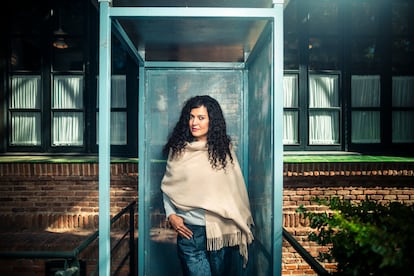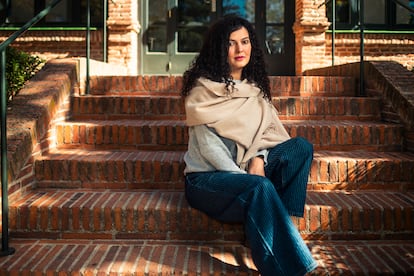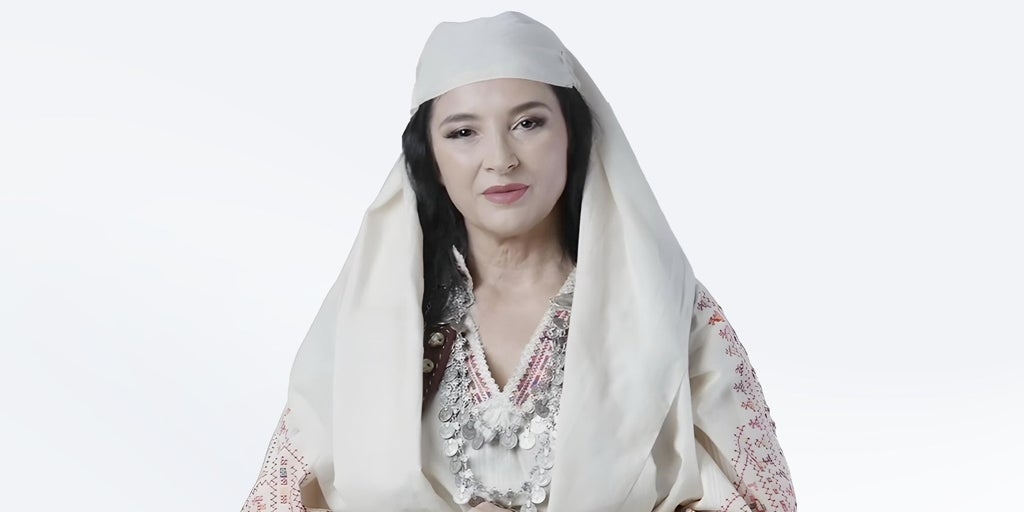Aliyeh Ataei, Iranian writer: “I write about violence with detachment because I grew up in it.”

The author, of Afghan origin, has just published in Spanish 'The Border of the Forgotten', a novel where she mixes autofiction and collective memory to narrate the wars in Afghanistan from the perspective of those who have been left out of history.

“When you’ve seen from a young age that one human being can kill another, it’s possible that you no longer feel anything in the face of death.” The quote is fromThe Border of the Forgotten . (Conatus Publishing, 2025), the novel recently translated into Spanish by Iranian writer Aliyeh Ataei (Zahedan, Iran, 44 years old), in which she condenses the invisible scars left by growing up in a territory where lines blur and violence is just another element of the landscape. “Sometimes they call me an Iranian writer, other times, an Afghan one; but in reality, I'm from the border,” says Ataei, who grew up in Darmian. This city, in eastern Iran, about 100 kilometers from Afghanistan, ironically means “between” or “in the middle” in Persian, the author points out.
“I have a toxic relationship with borders ; I love them and I hate them; they are my home and also my wound,” she says in an interview with EL PAÍS last Monday at the Residencia de Estudiantes in Madrid, where she senses that those art-soaked walls bring her a calm she doesn't feel elsewhere. She now lives in France, but borders remain one of her obsessions. For her, they are not just lines on a map. “I see borders everywhere, even now I see a border between you [referring to the journalist] and me, between men and women, between those who speak and those who remain silent… Even in freedom there are borders.”
And from the border where she was born and raised, Ataei narrates the wars in Afghanistan , the tribal conflicts, and the communist persecution from the perspective of what she considers “the forgotten”: the children, women, and families struggling to survive in an environment where violence is normalized. “When you’re a child, you don’t understand war. You think that everything that’s destroyed has something to do with you, that you’ve done something wrong,” she describes. “I remember seeing corpses as a child, and no one protected us from that. They considered it normal. That normality is the real tragedy,” she states. And that’s how she explains why, in Iran, when she published her novel, some critics labeled it a “cold book about violence.” “I write about violence with detachment because I grew up in it, and that’s why I don’t shout or exaggerate, but writing is my way of resisting it,” she says.
I have a toxic relationship with the border; I love it and I hate it; it's my home and also my wound
Ataei witnessed the cruelty of which human beings are capable when, as a very young child, she saw the mutilated and shrouded body of her aunt Mahbubé, murdered along with her family in an Afghan village after being accused of being a communist, being loaded into an ambulance. She also witnessed it when, at 18, she received the news that her fiancé had been murdered in Kabul and that the killer “had torn off his hand as a sign of hatred.” And when her aunt Anar returned home without a tongue, because “the Taliban had cut it out for teaching English to the children .”

“I started writing the book after my father died because I wanted to talk about his life, his illness, and his pain, but I only did so in one chapter; the rest are stories about other people. It’s a novel about the dead, who don’t bother anyone because you can no longer influence their fate.” When he talks about his father, a former soldier who returned from the war with mental scars, his hands tremble. “In war, the men who die are heroes, but no one sees those who return ill. My father was forgotten for 28 years,” he says. From that invisibility, his need to write this novel was born. “At first, I thought I wanted to tell his story, but then I understood that I wanted to tell the story of all those who were left out of the epic and the heroic narrative.”
Write to understand, “not to remember”However, although many of her stories and those of other characters are real, she avoids defining her work as autobiographical and prefers the term “autofiction.” “I don’t write about myself directly, but about the concept of ‘us,’” she explains. “I write to understand, not to remember. Because memory doesn’t always save you; sometimes it hurts you.” In her book, personal pain is interwoven with collective history, the characters move between reality and fable, and the metaphors reveal both individual experiences and those of an entire people.
I wanted to tell the story of all those who were left out of the epic and the heroic.
This is the case in the episode where she recounts how she used to hunt scorpions as a child with her cousin. They would put these arachnids in a glass jar to see which was the strongest, until her father forbade it after an invasion of "brown scorpions" of another species, which killed 80 children in a single night with their deadly venom. "But it is true that as a child I played with scorpions and not fish, and that I was stung several times; that's why when I wrote that passage I thought about that pain, about how everyone fights and in the end destroys each other; about how before the enemy even arrives, we have already killed each other."
Among his favorite characters, Ataei highlights the one perhaps most closely linked to the idea of blurred borders: Mohammed Hozmoud, a smuggler who helps people cross between Iran and Afghanistan, a man on the fringes of good and evil. “He’s a real person,” says Ataei. “I walked with him many times. In the book, he might seem like a trafficker, but in reality, he saved lives. He’s accused of being a criminal, but I see him as someone who did what the state wouldn’t: help people survive.” Ataei sees himself in him. “He sells people, and I sell books. We both try to cross borders.”
In his life and work, this idea of transcending boundaries goes beyond territory: it becomes a way of being in the world. “One day I told my father I hated my life, and he replied, ‘You’re not a tree, you have feet, you can walk.’ From then on, I understood that I don’t have roots, but rather feet.” He also acknowledged that he doesn’t seek a homeland. “For me, a homeland isn’t a land, it’s a language. Farsi is my home. And sometimes people are too. Sometimes, kindness can be a homeland.”
EL PAÍS





